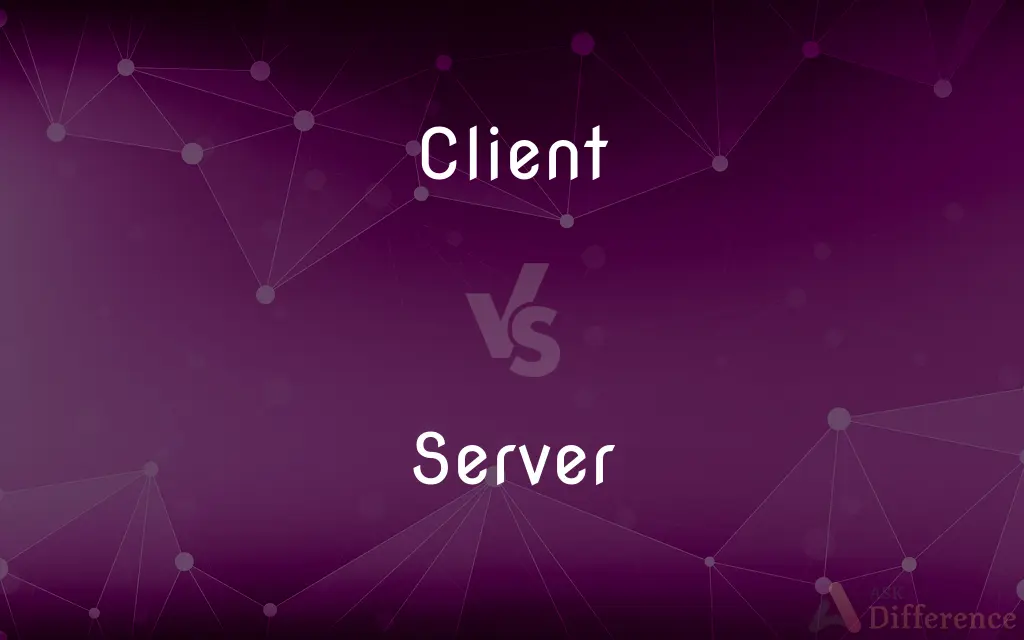Client vs. Server — What's the Difference?
By Tayyaba Rehman — Updated on September 20, 2023
A client requests data or services, while a server provides or processes these requests.

Difference Between Client and Server
Table of Contents
ADVERTISEMENT
Key Differences
A client, in computing, typically refers to a computer or software that sends requests to another system or component. It seeks information or a service and waits for a response. For instance, when you browse the internet on your computer or phone, the device acts as a client by asking for the webpage from a server. On the other hand, a server is designed to listen for requests, process them, and deliver the desired data or service. When we talk about web servers, they store web pages and deliver them to clients when requested.
Both clients and servers play crucial roles in the realm of computer networks, ensuring the smooth transfer of data. The client initiates a transaction by sending a request, aiming to retrieve information or enact a specific operation. Conversely, servers are the backbone of this process, holding the necessary resources and functions the clients seek. Without servers, clients wouldn't have a source from which to retrieve the requested data.
The interaction between clients and servers forms the basis of the client-server model, a distributed application framework that partitions tasks or workloads. Clients are often equipped with user-friendly interfaces, enabling users to input their requests easily. Servers, in contrast, have the tools, applications, and data needed to address these demands.
While clients can be lightweight and are often various types of devices, servers tend to be more robust and powerful, equipped to handle multiple requests simultaneously. The efficiency and performance of the server can directly impact the experience of the client.
Comparison Chart
Role
Requests data or services
Provides or processes requests
ADVERTISEMENT
Interaction
Initiates transaction
Responds to transaction
Design Purpose
User interface and data request
Store, process, and deliver data or services
Typical Hardware
PCs, smartphones, tablets
Dedicated, powerful machines
Dependence
Relies on servers for data/services
Operates independently but serves clients
Compare with Definitions
Client
An entity that relies on a server for resources.
The gaming client connected to the main server.
Server
A machine that processes and responds to client requests.
The web server delivered the webpage swiftly.
Client
A user interface that allows interactions.
The client had an intuitive design for users.
Server
A system providing resources, data, or services.
The company's server stores all the essential files.
Client
A device that seeks data from a server.
Her smartphone acted as a client when downloading the app.
Server
The backbone in the client-server model.
The chat application's server ensured real-time communication.
Client
A requester in a network transaction.
The client sent a request for the video file.
Server
An entity in networks that holds and delivers content.
The media server streamed the movie seamlessly.
Client
A person or organization using the services of a lawyer or other professional person or company
Insurance tailor-made to a client's specific requirements
Server
A powerful computer designed to handle multiple tasks.
The new server can manage thousands of simultaneous connections.
Client
(in a network) a desktop computer or workstation that is capable of obtaining information and applications from a server
Workstation clients are going to be easy to install
Server
One who serves food and drink. See Usage Note at waiter.
Client
(in ancient Rome) a plebeian under the protection of a patrician.
Server
Something, such as a tray, that is used in serving food and drink.
Client
The party for which professional services are rendered, as by an attorney.
Server
An altar server.
Client
A customer or patron
Clients of the hotel.
Server
(Law) One who serves a legal process, such as a summons or court order.
Client
A person using the services of a social services agency.
Server
(Sports) The player who serves, as in court games.
Client
One that depends on the protection of another.
Server
A file server.
Client
A client state.
Server
A computer that processes requests for HTML and other documents that are components of webpages.
Client
(Computers) A computer or program that can download files for manipulation, run applications, or request application-based services from a file server.
Server
(computing) A program that provides services to other programs or devices, either in the same computer or over a computer network.
Client
A customer, a buyer or receiver of goods or services.
Server
(computing) A computer dedicated to running such programs.
Client
(computing) The role of a computer application or system that requests and/or consumes the services provided by another having the role of server.
Server
One who serves.
Client
A person who receives help or services from a professional such as a lawyer or accountant.
Server
A waitress or waiter.
Client
(legal) A person who employs or retains an attorney to represent him or her in any legal matter, or one who merely divulges confidential matters to an attorney while pursuing professional assistance without subsequently retaining the attorney.
Server
The player who serves the ball.
Client
A citizen who put himself under the protection of a man of distinction and influence, who was called his patron.
Server
(Christianity) A priest's attendant at the celebration of the Eucharist.
Client
A dependent; one under the protection of another.
I do think they are your friends and clients,And fearful to disturb you.
Server
A tray for dishes.
Client
One who consults a legal adviser, or submits his cause to his management.
Server
A spoon for serving food.
Client
A person who seeks the advice of a lawyer
Server
One who serves.
Client
Someone who pays for goods or services
Server
A tray for dishes; a salver.
Client
(computer science) any computer that is hooked up to a computer network
Server
A person whose occupation is to serve at table (as in a restaurant)
Client
A computer system or software that requests services.
The client software on her laptop helps her access email.
Server
(court games) the player who serves to start a point
Server
(computer science) a computer that provides client stations with access to files and printers as shared resources to a computer network
Server
Utensil used in serving food or drink
Common Curiosities
What is a web client?
A web client is a device or software that accesses web services, like browsers.
How do clients communicate with servers?
Clients use protocols like HTTP or FTP to communicate with servers.
Can a smartphone be a client?
Yes, smartphones act as clients when accessing online services.
Do servers run continuously?
Typically, servers run 24/7 to provide uninterrupted services.
Can a machine be both a client and a server?
Yes, a machine can function as both, depending on the context.
Are servers exclusive to computing?
No, "server" can also refer to a person or thing that serves, like in restaurants.
Why are servers usually more powerful than client machines?
Servers need to handle multiple client requests simultaneously.
What's a client-server architecture?
It's a model where clients request services and servers provide them.
Is a database a type of server?
Yes, databases can be hosted on servers and respond to client queries.
What's the difference between a web server and an application server?
A web server handles HTTP requests, while an application server runs applications.
Can a single server serve multiple clients simultaneously?
Yes, servers are designed to handle multiple concurrent client requests.
Can one server communicate with another server?
Yes, servers can interact with each other, often called server-to-server communication.
What happens if a server fails?
Clients may not access the services, leading to downtime.
Are there security risks in the client-server model?
Yes, both clients and servers can be vulnerable to attacks.
How do clients and servers identify each other?
They use IP addresses and domain names.
Share Your Discovery

Previous Comparison
Groove vs. Grove
Next Comparison
Rather vs. ButAuthor Spotlight
Written by
Tayyaba RehmanTayyaba Rehman is a distinguished writer, currently serving as a primary contributor to askdifference.com. As a researcher in semantics and etymology, Tayyaba's passion for the complexity of languages and their distinctions has found a perfect home on the platform. Tayyaba delves into the intricacies of language, distinguishing between commonly confused words and phrases, thereby providing clarity for readers worldwide.















































